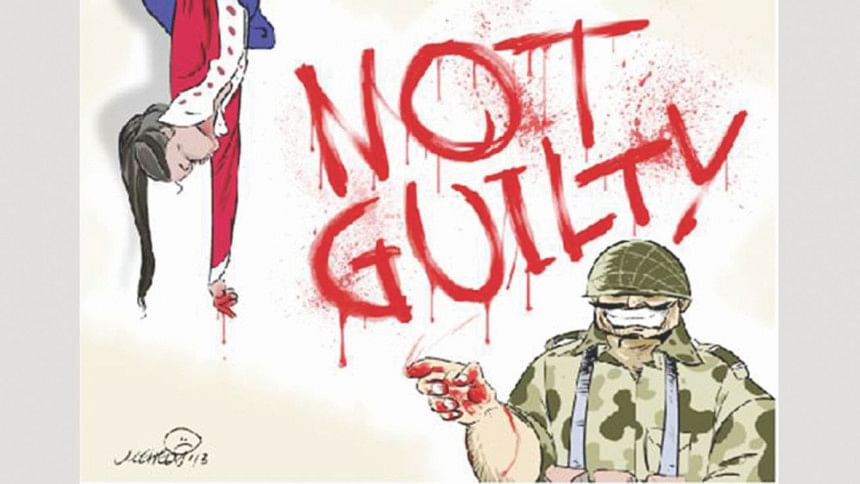LEGAL ASPECTS OF FELANI'S MURDER

Justice hasn't been done in case of Felani, as BSF jawan Amiya Ghosh, an accused of killing 15 year old girl at the Indo-Bangla border in January 2011, was acquitted by the BSF court in retrial. When a security force favours its staff in trial, it is quite difficult to even think of getting justice. The killing of Felani raised a huge outcry across the world. Judgment of BSF court will encourage its border guards to violate human rights along the borders with impunity. Even laws in India including BSF Act do not approve killing people indiscriminately during crossing border illegally. In other words, India could easily prosecute alleged trespassers on the basis of its own laws instead of killing them. As Felani was a minor girl, it is clearly violation of child rights. Though in various international conventions and treaties there are restrictions on cross border killing without lawful ground, it is continuously occurring in the name of security and sovereignty of country.
The United Nations Basic Principles on the Use of Force and Firearms by Law Enforcement Officials calls upon officials to apply, as far as possible, non-violent means before resorting to the use of force and firearms. Officials are required to exercise restraint and “act in proportion to the seriousness of the offense.”
In the perspective of killing of Felani, seeking fair trial and compensation a writ petition (Writ Petition (Criminal) No. 201 of 2013) has been filed by myself Salma Ali accompanied by Felani's father with the Indian Supreme Court on September 27, 2013 which is now pending. Meanwhile, previously in a rape case (The Chairman, Railway Board & others v Chandrima Das & others, C.A. No. 639 of 2000) of Bangladeshi woman Hamida Khatun (fictitious name), who was gang-raped by many including employees of the Railways in a room of Yatri Niwas at Howra Station of the Eastern Railway, Indian Supreme Court delivered a landmark judgment. Through that judgment the rights of foreign nationals was established, under the Indian constitution. It was held by the Hon'ble Court that although the victim wasn't a citizen of India was nevertheless entitled to all constitutional rights available to a citizen so far as “Right to Life” was concerned. As a national of another country, she couldn't be subjected to a treatment, which was below dignity, nor could she be subjected to physical violence. Moreover, in that rape incident Indian trial court sentenced the accused persons for 12 years imprisonment. In the writ petition on killing of Felani that reference of the rape case was brought before the court. We expect a substantive result from the apex court.
Question has been raised whether security forces have a right to kill a person even if the person is found to be committing an act that is presumably illegal but unarmed. BSF constable by shooting has infringed of several international convention or treaty.
It is gross violation of the spirit in the preamble and the Articles enlisted in the Universal Declaration on Human Rights (UDHR). The preamble of the UDHR depicted that recognition of the inherent dignity and the equal and inalienable rights of all members of the human family is the foundation of freedom, justice and peace in the world. According to Article 1 of UDHR all human beings are born free and equal in dignity and rights. They are endowed with reason and conscience and should act towards one another in a spirit of brotherhood. Article 3 of UDHR stated that everyone has the right to life, liberty and security of person whereas Article 5 exposed that no one shall be subjected to torture or to cruel, inhuman or degrading treatment or punishment.
There has been gross violation of the Articles enlisted in Convention on Child Rights (CRC) to which both Bangladesh and India are signatories of. In accordance with Article 3 of CRC, in all actions concerning children, whether undertaken by public or private social welfare institutions, courts of law, administrative authorities or legislative bodies, the best interests of the child shall be a primary consideration. Moreover, Article 6 of CRC explained that states parties recognize that every child has the inherent right to life.
The Schengen Borders Code and the EU Action Plan on Unaccompanied Minors recommended border guards to pay special attention to minors whether travelling accompanied or unaccompanied and to act as far as possible in the best interest of the child treating them as children first rather than criminals.
Under Article 21 of the Indian Constitution guarantees the right to live. In the case of Lous De Raed v Union India (1991) 3 SSC 554, it was held that the right to life and liberty extends to a foreigner as well.
It is noteworthy that victim was unarmed and didn't pose any danger to the security of India. The general principle is to have necessity and proportionality while using force in the border area, border guards must use force only when necessary. Furthermore, the principles on the treatment of minor with special attention to minors and treat them as children before considering them as illegal immigrants.
It is significant to respect human rights and dignity through practicing tolerance, living together in peace with one another as good neighbours and maintaining international peace and security. Killing in border have to be stopped to ease tension at the border and to uphold human rights. Any kind of impunity is not acceptable at all. Instead of biasness, exemplary punishment has to be ensured for arbitrary killing violating international laws and norms. We don't want to see travesty, rather we expect that no perpetrator will be escaped from the purview of law merely in the name of security and in the long run justice will be ensured.
The writer is Executive Director, Bangladesh National Woman Lawyers Association (BNWLA).

 For all latest news, follow The Daily Star's Google News channel.
For all latest news, follow The Daily Star's Google News channel. 



Comments